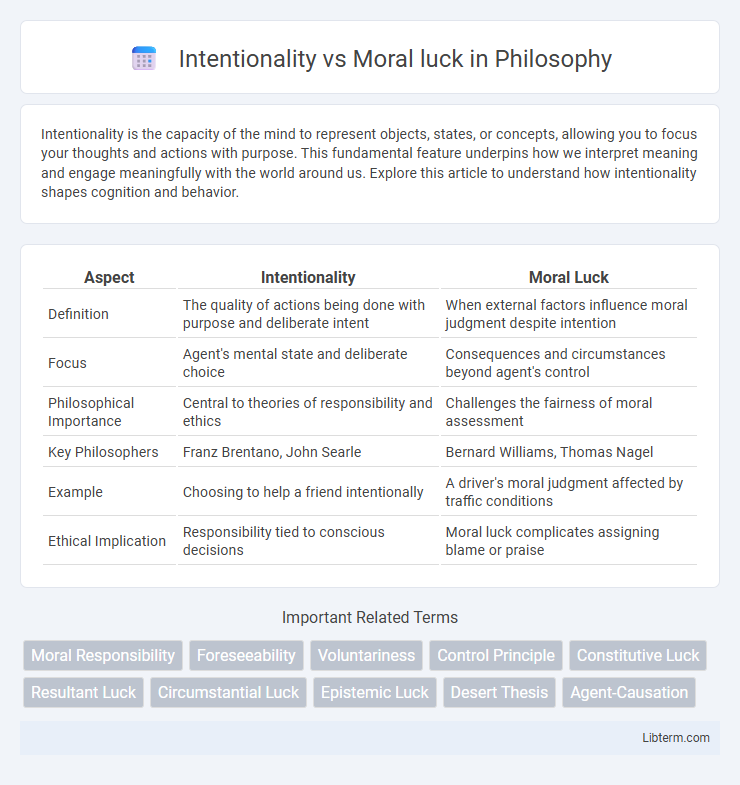Intentionality is the capacity of the mind to represent objects, states, or concepts, allowing you to focus your thoughts and actions with purpose. This fundamental feature underpins how we interpret meaning and engage meaningfully with the world around us. Explore this article to understand how intentionality shapes cognition and behavior.
Table of Comparison
| Aspect | Intentionality | Moral Luck |
|---|---|---|
| Definition | The quality of actions being done with purpose and deliberate intent | When external factors influence moral judgment despite intention |
| Focus | Agent's mental state and deliberate choice | Consequences and circumstances beyond agent's control |
| Philosophical Importance | Central to theories of responsibility and ethics | Challenges the fairness of moral assessment |
| Key Philosophers | Franz Brentano, John Searle | Bernard Williams, Thomas Nagel |
| Example | Choosing to help a friend intentionally | A driver's moral judgment affected by traffic conditions |
| Ethical Implication | Responsibility tied to conscious decisions | Moral luck complicates assigning blame or praise |
Defining Intentionality in Moral Philosophy
Intentionality in moral philosophy refers to the capacity of agents to act with purpose or deliberate consideration, crucial for assessing moral responsibility. It emphasizes the mental states and intentions behind actions, differentiating between intentional harm and accidental outcomes. This contrasts with moral luck, where outcomes beyond the agent's control affect moral judgment regardless of intent.
Understanding the Concept of Moral Luck
Moral luck challenges the traditional notion that morality depends solely on intention, highlighting how factors outside an individual's control influence moral judgment. This concept reveals that outcomes, circumstances, and luck significantly affect assessments of moral responsibility, even when intentions remain constant. Understanding moral luck requires recognizing the complex interplay between deliberate actions and unpredictable external variables in ethical evaluations.
Historical Perspectives on Moral Responsibility
Historical perspectives on moral responsibility emphasize the tension between intentionality and moral luck, with philosophers like Aristotle attributing moral worth primarily to intentions. Enlightenment thinkers such as Kant reinforced the centrality of rational intent in assessing moral accountability, while modern debates highlight how factors beyond control, or moral luck, complicate traditional views. This ongoing discourse reflects evolving understandings of human agency and ethical evaluation across philosophical traditions and time periods.
Types of Moral Luck: Resultant, Circumstantial, Constitutive, and Causal
Moral luck encompasses four key types: resultant, circumstantial, constitutive, and causal, each affecting ethical judgment based on factors beyond an agent's control. Resultant moral luck arises from unforeseen consequences of one's actions, while circumstantial luck pertains to the specific situations a person encounters, influencing moral responsibility. Constitutive moral luck involves inherent traits shaping behavior, and causal moral luck relates to the deterministic chain of events leading to an action, all challenging traditional views on intentionality in ethics.
The Role of Intentions in Ethical Judgments
Intentions play a crucial role in ethical judgments by determining the moral worth of an action beyond its outcomes. While intentionality assesses the agent's purpose and reasoning, moral luck highlights how unforeseen factors can influence the moral appraisal despite similar intentions. The contrast emphasizes that ethical evaluations often depend on both the agent's conscious aims and the external consequences beyond their control.
How Moral Luck Challenges Moral Accountability
Moral luck challenges moral accountability by undermining the clear connection between intent and moral judgment, as individuals may be praised or blamed for outcomes beyond their control. This complicates traditional assessments of culpability grounded in intentionality, where only deliberate actions should determine moral responsibility. The unpredictability of external factors impacting consequences forces a reevaluation of how justice and ethics assign accountability in real-world scenarios.
Famous Philosophical Debates: Nagel, Williams, and Others
Thomas Nagel and Bernard Williams famously debated the tension between intentionality and moral luck, with Nagel highlighting how factors beyond one's control can affect moral judgment. Williams argued that moral responsibility depends heavily on an agent's intentions and the context in which actions occur, challenging the fairness of assigning blame or praise based solely on outcomes. Their discussions continue to shape contemporary philosophy by emphasizing the complex interplay between an individual's inner motivations and external circumstances in ethical evaluation.
Everyday Examples: Intentionality vs. Luck in Real Life
Everyday examples highlight the contrast between intentionality and moral luck, such as when a driver intentionally runs a red light but causes no accident versus another driver unintentionally running a red light and causing a collision. Intentional actions are judged based on the agent's awareness and purpose, while moral luck evaluates outcomes beyond control, impacting moral responsibility. This distinction influences legal and ethical assessments, where intentions often determine culpability, but consequences driven by luck complicate blame or praise.
Reconciling Intentionality and Moral Luck: Possible Solutions
Reconciling intentionality and moral luck requires nuanced approaches that balance agent intentions with outcome influences beyond control. A promising solution involves distinguishing between the moral evaluation of intentions and the attribution of responsibility for consequences, allowing for differentiated judgments. Additionally, integrating contextual factors and emphasizing the role of knowledge and foreseeability can help align intentionality with moral assessments in cases affected by luck.
Implications for Law, Ethics, and Personal Responsibility
Intentionality plays a crucial role in determining legal culpability, as laws often distinguish between deliberate actions and unintended consequences, impacting judgments of guilt and sentencing. Moral luck challenges this framework by highlighting how factors beyond an individual's control can affect moral appraisal and legal outcomes, complicating assessments of personal responsibility. This tension influences ethical debates and legal standards, prompting reconsideration of accountability criteria in criminal and civil law.
Intentionality Infographic

 libterm.com
libterm.com